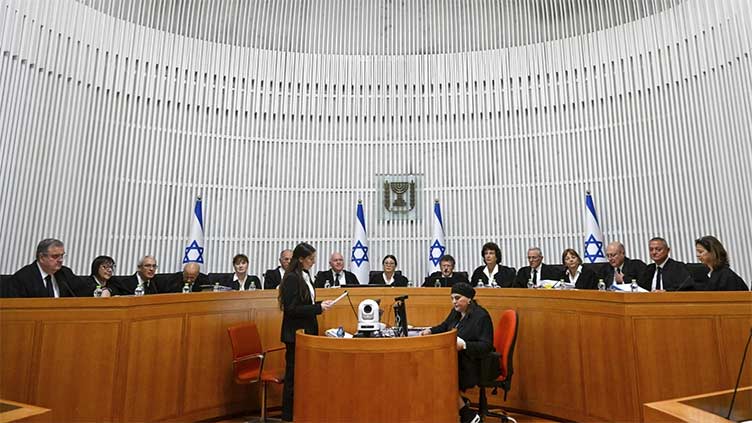Israel’s Supreme Court on Tuesday opened the first case to look at the legality of Prime Minister Benjamin Netanyahu’s contentious judicial overhaul — deepening a showdown with the far-right government that has bitterly divided the nation and put the country on the brink of a constitutional crisis.
In a sign of the case’s significance, all 15 of Israel’s Supreme Court justices are hearing appeals to the law together for the first time in Israel’s history. A regular panel is made up of three justices, though they sometimes sit on expanded panels. The proceedings were also being livestreamed.
“It’s a historic day,” said Susie Navot, vice president of the Israel Democracy Institute, a Jerusalem think tank that has been critical of the overhaul. “This is the first time we’ve had this kind of hearing.”
Netanyahu’s coalition, a collection of ultranationalist and ultrareligious lawmakers, launched the overhaul early this year, shortly after taking office. Proponents of the plan say the country’s unelected judiciary, led by the Supreme Court, wields too much power. Critics say the plan to weaken the Supreme Court removes a key safeguard and will concentrate power in the hands of Netanyahu and his allies.
“We stand here today with millions of citizens to stop the government’s coup,” said Eliad Shraga, chairman of the Movement for Quality Government in Israel, which filed a petition along with a handful of other civil society groups. “Together we will preserve Israeli democracy.”
The hearing on Tuesday puts the country’s senior justices in the unprecedented position of deciding whether to accept limits to their own powers. It focuses on the first law passed by parliament in July — a measure that cancels the court’s ability to strike down government decisions it deems to be “unreasonable.” Judges have used the legal standard in the past to prevent government decisions viewed as unsound or corrupt.
The judicial overhaul — which opponents characterize as a profound threat to Israeli democracy — has infuriated Israelis across many segments of society, bringing hundreds of thousands into the streets to march at one protest after another for the past 36 weeks.
The protesters have come largely from the country’s secular middle class. Leading high-tech business figures have threatened to relocate. Perhaps most dramatic, thousands of military reservists have broken with the government and declared their refusal to report for duty over the plan.
Netanyahu’s supporters tend to be poorer, more religious and live in West Bank settlements or outlying rural areas. Many of his supporters are working-class Mizrahi Jews, with roots in Middle Eastern countries, and have expressed hostility toward what they say is an elitist, secular class of Ashkenazi, or European, Jews.
Late on Monday, tens of thousands of Israeli protesters crowded around the Supreme Court, waving national flags and chanting against the government.
The law passed as an amendment to what in Israel is known as a “Basic Law,” a special piece of legislation that serves as a sort of constitution, which Israel does not have. The court has never struck down a “Basic Law” before but says it has the right to do so. The government says it does not.
In a statement ahead of Tuesday’s hearing, Israeli Justice Minister Yariv Levin said the court “lacks all authority” to review the law.
“It is a fatal blow to democracy and the status of the Knesset,” he said, insisting that lawmakers elected by the public should have the final say over the legislation.
While the attorney general would typically represent the government in such a hearing, Attorney General Gali Baharav-Miara — a main target of the coalition’s attacks — has refused to defend the judicial overhaul in court. The sponsors of the law then turned to outside counsel.
A ruling is not expected on Tuesday, but the hearing could hint at the court’s direction.
The case is at the heart of a wider contest in Israel between fundamentally different interpretations of democracy. Netanyahu and his coalition say that as elected representatives, they have a democratic mandate to govern without being hobbled by the court, which they portray as a bastion of the left-leaning elite.
Opponents say that the court is the only check on majority rule in a country with such a weak system of checks and balances — just one house of parliament, a figurehead president and no firm, written constitution. They say that without the power to review and overturn some government decisions, Netanyahu’s government could appoint convicted cronies to Cabinet posts, roll back rights for women and minorities, and annex the occupied West Bank — laws that the court with its current powers would be likely to strike down.
“We must remember that democracies don’t die in one day anymore,” Navot from the Israel Democracy Institute said. “Democracies die slowly, step by step, law by law. And therefore we should be very careful with this kind of judicial overhaul.”
The political survival of Netanyahu, who returned to power late last year while on trial for corruption, depends on his hard-line, religiously conservative coalition partners who have threatened to rebel if he forestalls the legislation.
Netanyahu has refused to say clearly whether he would respect a decision by the court to strike down the new law. Some members of his coalition, including Levin, have hinted that the government could ignore the court’s decision.
Legal experts warn that could spark constitutional crisis, where citizens and the country’s security forces are left to decide whose orders to follow — the parliament’s or the court’s — thrusting the country into uncharted territory.
Post Views: 66


 Sports3 months ago
Sports3 months ago
 Fashion2 months ago
Fashion2 months ago
 Sports3 months ago
Sports3 months ago
 pakistan3 months ago
pakistan3 months ago
 pakistan3 months ago
pakistan3 months ago
 World2 months ago
World2 months ago
 World2 months ago
World2 months ago
 Sports2 months ago
Sports2 months ago



















